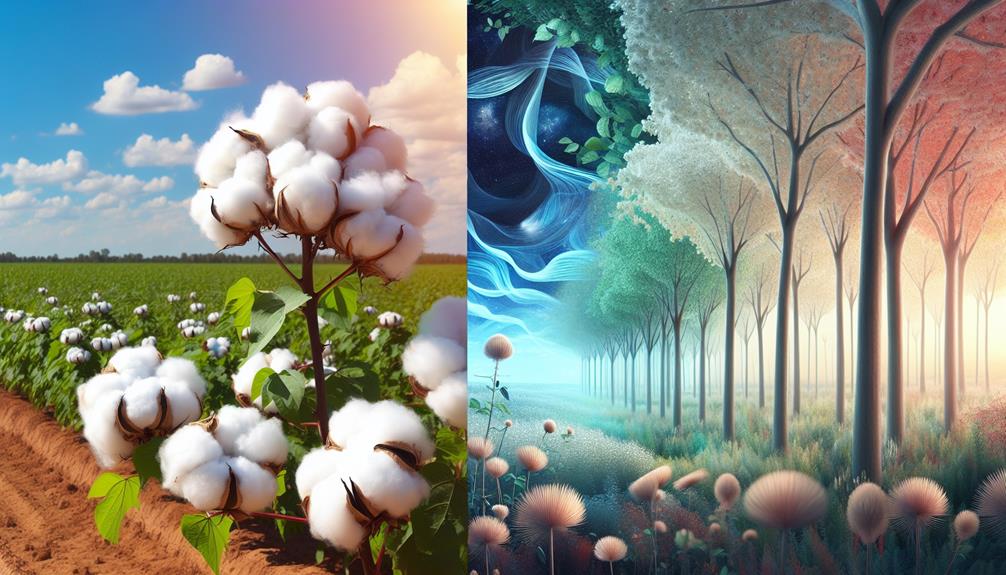Honestly, it depends on what you're looking for. Tencel is super soft, silky, and great for keeping you cool, plus it's eco-friendly since it's made from sustainable wood and uses less water and chemicals. It's also really strong and holds color well, which means it stays looking new longer. But, it does cost more and needs gentle care. Cotton, on the other hand, is your go-to for comfort. It's breathable, hypoallergenic, and gets softer with each wash. It's versatile and generally easier on your wallet. Each fabric has its perks, so think about what's important for you. Let's explore more, shall we?
Table of Contents
Key Takeaways
- Tencel offers superior moisture-wicking and feels silkier than cotton, making it ideal for sensitive skin and warm climates.
- Cotton is more versatile and withstands hot water better, making it suitable for a wide range of uses.
- Tencel's production is more eco-friendly, utilizing a closed-loop process that minimizes waste and uses renewable resources.
- Cotton is generally more affordable and offers a wider variety of patterns and colors, appealing to diverse tastes.
- Tencel requires more delicate care and is pricier, but its durability and luxurious feel may justify the investment for some.
Understanding Tencel
What's Tencel, and why is it becoming a popular choice in sustainable fabrics? Well, let me break it down for you.
Tencel is a brand name for a type of fabric made by Lenzing AG, which is all about being kind to our planet. This fabric comes mainly in two forms: Tencel Lyocell and Tencel Modal. The Lyocell type is made from eucalyptus wood, while Modal comes from beech trees. Both types are pretty cool because they use a special process that recycles almost all the solvent used, making this super eco-friendly.
Now, one of the big wins for Tencel is its strength combined with its ability to wick moisture away. This makes it a top choice for anyone looking for comfort, especially if you've got sensitive skin or are hoping for a cooler sleep. The fabric's cooling properties are nothing short of a game-changer for many.
Plus, if you're into products like duvets, knowing they're crafted from 100% Tencel Lyocell, which offers not just comfort but also helps regulate temperature and supports environmental sustainability, is a massive plus. So, yeah, Tencel is kind of a big deal in the world of sustainable fabrics!
Exploring Cotton
Now, let's talk about cotton, another fabulous option in the world of natural fibers. I've always loved how soft and breathable cotton is, making it a go-to for everything from comfy tees to those cozy percale cotton sheets we all adore.
Speaking of percale, it's one of the coolest weaves you can choose for your sheets, especially if you're living somewhere warm. It's crisp, lightweight, and oh-so-breathable!
What really stands out about cotton is its variety. You've got your basic Upland cotton, which is pretty much everywhere. But then there's Pima cotton, which is like the luxury sedan of cottons. It's super soft, incredibly durable, and it just feels amazing whether you're slipping into a shirt or into bed. And let's not forget, for those of us with sensitive skin, cotton is hypoallergenic. It's gentle and won't irritate, which is a huge plus.
Whether you're picking out new clothes or sprucing up your bedroom, cotton offers that perfect blend of comfort, quality, and care. It's versatile, dependable, and honestly, just feels like home no matter how you use it.
Production Processes
Let's dive into how Tencel and cotton are made, which is quite fascinating! Starting with Tencel production, the process begins by transforming wood pulp into a smooth fiber. Here's how it goes:
- Wood pulp gets dissolved in a non-toxic solvent.
- The solution is then pushed through tiny holes to form fibers.
- These fibers are spun into yarn and woven into fabric.
What's super cool here is that nearly all (99%) of the solvent used is recycled, making Tencel production a star in eco-friendly manufacturing.
On the flip side, cotton production is a bit more traditional:
- First, cotton plants are harvested and the fibers are separated from the seeds using a machine known as the Cotton Gin.
- These fibers are then spun into yarn and can be woven into various types of fabrics like flannel or sateen.
Both processes have their unique steps, but it's clear that a lot of thought goes into making both Tencel and cotton as efficient and sustainable as possible. Whether it's the high-tech eco-friendly approach of Tencel or the more classic route taken by cotton production, each has its merits in the textile industry.
Environmental Impact
When comparing the environmental impacts, Tencel stands out as the more sustainable choice over traditional cotton. Here's why: Tencel's got a pretty neat way of being made. It comes from eucalyptus trees, which are renewable. Plus, its production process is what they call closed-loop. That means almost all the solvents and water used are recycled and reused. It's like a cycle that keeps everything neat and tidy, minimizing waste and being kinder to our planet.
Now, let's talk about cotton production. It's a thirsty business, needing a lot of water. Plus, it uses a bunch of pesticides, which isn't great for the earth. Comparing that to Tencel, which uses way less water and energy, the difference is clear. Tencel is just more eco-friendly.
Comfort Comparison
Switching gears to comfort, Tencel often feels softer and silkier than cotton, offering a more luxurious touch. When I first tried Tencel sheets, the difference was pretty noticeable. They just glide over the skin, which is a huge plus for me since I tend to sleep hot.
Here are a few key points to consider when talking about comfort:
- Softness: Tencel sheets win here. They're just inherently smoother and feel more like you're slipping into a high-end hotel bed.
- Breathability: Ideal for those warm nights, Tencel's moisture-wicking properties keep it cool and comfy.
- Hypoallergenic: While both materials are friendly for sensitive skin, cotton is naturally hypoallergenic, making cotton sheets a solid choice for allergy sufferers.
Having used both, I can say that cotton sheets aren't without their charms. They offer that crisp, classic feel that many of us grew up loving. But if you're angling for that extra bit of comfort, especially in warmer climates, Tencel sheets might just be your best bet. It's about finding what feels right and works best for your sleep style.
Durability and Care
While we've talked about how comfortable each material can be, it's also important to consider how well they hold up over time and how they should be cared for.
Let's start with durability. Tencel sheets are definitely the champs here. They're more resistant to wear and tear than cotton sheets. This means they're less likely to thin, pill, or fade, even after you've had them for a while. So, if you're looking for something that's gonna last longer and stay in good shape, Tencel might be your go-to.
Now, onto care. This is where cotton kind of bounces back. Cotton sheets can take the heat—literally. You can wash them in hot water, and they just get softer with each wash. But remember, even though they're tougher in the wash, they don't hold up as well over time as Tencel does.
Tencel, on the other hand, needs a bit more TLC. You'll want to stick to gentle cycles and cooler temperatures to keep them in tip-top shape. Following the proper care instructions is crucial for both materials if you want them to last and keep their quality. So, make sure you're reading those labels!
Price Considerations
Let's dive into how much you might've to shell out for Tencel versus cotton sheets. If you're deciding between these two, price considerations can really sway your choice. Generally, you'll find Tencel sheets are pricier than most cotton options. That said, the range of prices for cotton sheets is huge, depending on what kind of cotton you go for.
Here's a quick rundown to give you a clearer picture:
- Tencel Sheets: Tend to be more expensive due to their eco-friendly production and luxurious feel.
- Cotton Sheets: Prices vary widely. Basic cotton sheets are affordable, but high-end options like Egyptian cotton can get pretty pricey.
- What Fits Your Budget: Ultimately, it boils down to what you're willing to spend. Tencel might be more of an upfront investment, but the comfort and sustainability factor could be worth it for you.
Style and Variety
When we're talking style and variety, both cotton and Tencel have plenty to offer. Cotton's been a favorite for years because it comes in loads of patterns and colors; you can find just about any look you want.
Meanwhile, Tencel's catching up with its own trendy options and luxurious feel, making it a solid choice for those who love a bit of pampering.
Fashion Trends
In fashion trends, both cotton and Tencel bring their unique styles and textures to the table, offering something for everyone. As a fabric enthusiast, I've noticed a few standout qualities:
- Cotton fabrics are incredibly versatile, ranging from the crisp feel of percale to the cozy warmth of twill.
- Tencel clothing is gaining traction for its silky texture and stunning drape, perfect for those who love a touch of luxury.
- The eco-friendly production of Tencel aligns well with the growing demand for sustainable fashion choices.
Both materials serve different needs in the fashion world, with cotton being the go-to for comfort and durability, while Tencel shines in the eco-conscious and luxury segments.
Color & Pattern Options
Diving into color and pattern options, Tencel and cotton both offer exciting varieties that cater to different style tastes.
I've noticed Tencel fabrics generally provide a broader spectrum of color options, and they're absolutely killer when it comes to how vibrant they stay, even after loads of washes. This fabric takes dye like a champ, leading to some super rich and long-lasting colors.
On the flip side, cotton's got its charm with a decent range of patterns, but Tencel steps it up with more contemporary and slick designs. Its smooth texture really makes those intricate patterns pop.
Whether you're into classic or trendy looks, both materials have got you covered with their versatile color and pattern choices.
Fabric Versatility
While we've seen how Tencel and cotton shine in color and patterns, let's explore how their versatility in fabric weaves plays into style and variety. Cotton fabric isn't just about being comfy; it's super versatile:
- Percale and Sateen: Choose percale for a crisp, cool feel, or sateen for a smoother, lustrous touch.
- Twill: Offers a durable texture that's great for daily use.
- Flannel: Perfect for snuggling in colder months.
Tencel fibers, on the other hand, bring a silky charm to the table. Their elegant weaves make any bedding look luxurious and sophisticated. Both materials offer unique weaves that cater to your personal style and comfort needs, making them top choices for any setting.
Allergenic Properties
When it comes to allergies, both cotton and Tencel have their perks, but let's see how they really stack up.
I've always leaned towards cotton because it's known for being super gentle on sensitive skin. However, Tencel's softness and less irritating nature might give it a solid place for those with skin sensitivities.
Hypoallergenic Qualities Comparison
Both cotton and Tencel are top picks for folks with sensitive skin due to their hypoallergenic qualities. When it comes to choosing materials that won't trigger allergies, it's a close competition between these two.
- Cotton: Naturally hypoallergenic, cotton is a preferred choice for those avoiding chemical dyes. Dermatologists appreciate its exceptional breathability.
- Tencel: Softer than cotton and less likely to cause skin irritations, Tencel could become your new go-to if you have sensitive skin.
- Skin-Friendly: While both materials excel at being gentle on the skin, they each offer unique benefits.
Deciding between them largely relies on your personal sensitivities and which fabric feels more comfortable on your skin.
Skin Sensitivity Considerations
Considering your skin's needs, you might find that either cotton or Tencel could be the right choice due to their gentle allergenic properties. If you've got sensitive skin, here's the scoop: cotton is a classic go-to. It's hypoallergenic and lets your skin breathe, which is a huge plus. Dermatologists often nod towards cotton for anyone who's got skin sensitivity issues or hates the itch from chemical dyes.
But don't count out Tencel just yet. It's actually softer than cotton and less likely to cause irritation. So, if you're after something that feels extra gentle against your skin, Tencel might just be your new best friend. Both are solid picks, but it really boils down to what feels best on your skin.
Thermal Regulation
Tencel's got the edge over cotton when it comes to keeping you cool and comfy all night. If you've ever woken up in the middle of the night feeling like you're in a sauna, you know how important thermal regulation is in your choice of bedding. That's where Tencel really shines compared to cotton.
Here's why Tencel is a superstar in the thermal regulation game:
- Breathability: Thanks to its nano-fibril structure, Tencel is super breathable, which allows air to circulate freely and helps keep your body cool.
- Moisture-wicking abilities: Tencel pulls moisture away from your skin, which not only keeps you dry but also helps in maintaining a cooler body temperature throughout the night.
- Resistance to shrinking: Unlike cotton, Tencel doesn't shrink after washes. This means it maintains its quality and ability to regulate temperature over time, making it a reliable choice for hot sleepers.
Consumer Preferences
When it comes to picking between cotton and Tencel, it's really about what you're looking for. If you're into softer sheets, you might lean towards Tencel, but if it's variety and warmth you want, cotton could be your go-to.
Let's take a closer look at what's trending and how people are making their choices.
Popular Material Choice Trends
In the world of fabrics, more and more folks are leaning towards Tencel for its eco-friendly perks and comfy feel. But don't get me wrong, cotton's still holding strong with its classic touch. Here's the scoop:
- Eco-friendly: Tencel wins big on the green scale, using less water and sustainable materials.
- Comfort: If you're looking for soft and silky, Tencel's your go-to. Plus, it's a champ at moisture-wicking, making it perfect for hot sleepers.
- Versatility: Cotton's variety in weaves makes it a perennial favorite for everything from tees to towels.
Buying Patterns Analysis
Let's take a closer look at why shoppers are leaning towards Tencel, even though cotton's still a strong contender. People are digging Tencel for its eco-friendly vibes and that smooth, silky feel it's got going on. But don't count cotton out just yet. It's still a go-to for lots of folks because it's tough, breathes well, and feels all-natural.
When it comes to picking between the two, it really boils down to what you need and what you're into. If you're all about staying cool and comfy, especially on those hot nights, Tencel's your buddy with its moisture-wicking magic. But if you're after something snug and classic, cotton's your best bet with its cozy feel and tons of textures.
Frequently Asked Questions
Is Tencel Fabric Better Than Cotton?
I'd say it depends on your needs. Tencel's great for breathability and softness, perfect if you're a hot sleeper. But if you're after durability and versatility, cotton might be the better choice for you.
What Are the Disadvantages of Tencel?
Tencel's downsides? It's pricier, needs gentle care, and the feel's too silky for some. The production's complex with environmental concerns, and it's not as warm as other fabrics in cold weather.
Does Tencel Last Longer Than Cotton?
Yeah, I've found that Tencel does last longer than cotton. It resists thinning, pilling, and fading much better, so it keeps its quality through more washes and regular use. It's pretty durable!
Does Tencel Shrink More Than Cotton?
I've found that Tencel actually shrinks less than cotton. Its fibers are more stable, which helps maintain its size and shape better. So, it's a more reliable choice if you're worried about shrinkage.
- Where to Buy Sherpa Suede Fabric - July 12, 2025
- How to Draw or Illustrate the Texture of Suede Fabric - July 12, 2025
- What Is Baseball Suede Leather Fabric? - July 12, 2025







